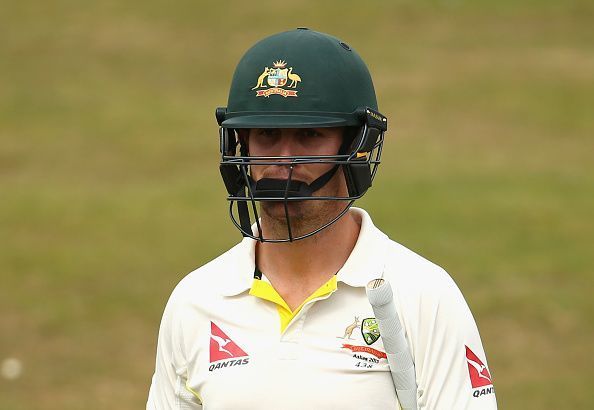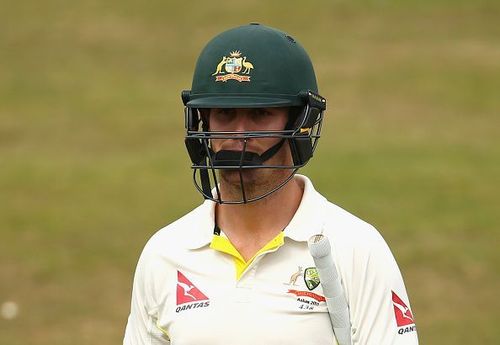
Opinion: Why Mitchell Marsh is Australia's biggest gamble

Few young cricketers have generated as much excitement in Australia as Mitchell Marsh when he burst onto the domestic cricketing scene at just 17 years old.
With his brother having already represented Australia in the shorter forms of the game, and his father being a veteran of 50 tests, Mitchell Marsh already bore the weight of great expectations.
But these expectations didn't seem to hinder him on his first-class debut, as Marsh made an unbeaten 59 while his side capitulated for 131. But the hype around Marsh was just beginning.
The following year Marsh captained the Australia Under-19s to a World Cup victory, top scoring for his side in both the semi and quarterfinals.
Then, still only a teenager, in 2011 Marsh made his T20I debut for Australia. he looked at home on the international stage, striking a brisk 36 that included four sixes. He even made an impact on his ODI debut, taking the key wicket of Hashim Amla to help Australia achieve victory in a rain-affected match.
The game took place a day before Marsh's twentieth birthday, but there was already talk of him as a future Australian captain. However, it was over three years until Marsh made his test debut, and then, for once, he didn't shine. He failed to take a wicket in both innings and scored just 27 and 3 as Pakistan eased to victory.
In the intervening years, Marsh would become one of the most divisive players in Australian cricket. He performed solidly in ODIs, but as a test player, he only showed glimpses of his talent, continually in and out of the team due to selection and injury.
Now 27, Marsh has 30 tests to his name, with a batting average of just 26.08, and a similarly unflattering bowling average of 42.45.
Few players with such statistics are likely to earn so many tests. But the Australian selectors have invested a great deal in Marsh. He has continually been picked out of the belief that eventually he'd find some consistency and become the player he promised to be when he was just a teenager.
Even recently, the selectors made the huge decision of naming Marsh joint vice-captain, along with his former Under-19 teammate Josh Hazlewood. The two tests that followed this announcement did little to sway Marsh's doubters, as he failed to reach 20 with the bat or take more than a single wicket in an innings.
Yet even those who contest Marsh's appointment as vice-captain and continued selection probably still believe he has the talent to succeed in test cricket.
Marsh showed this when he returned to the test side in December 2017. Many criticised the selectors' decision to recall Marsh, as he had done little in domestic cricket to warrant a spot in the team.
But Marsh had a fantastic game, scoring 181 to help Australia reclaim The Ashes. It was his maiden test hundred, and just two tests later he would add another one. Yet since then, he seems to have regressed.
Now Marsh finds himself in an important role for a fragile Australian side. Australian cricket is currently in a strange place. The suspensions of David Warner, Steve Smith, and to a lesser degree, Cameron Bancroft, have left an already suspect batting lineup severely weakened.
Usman Khawaja has the most test appearances of any of the batsmen in Australia's test squad with just 35, meaning Marsh isn't far from being the most experienced batsman in the side.
Batsmen currently come into consideration for the Australian test team on the back single performances, and players who average above 40 in domestic cricket are an oddity.
Yet at the same time, Australia's pace bowling depth is immense. While Chris Tremain forged his way into Australia's 14 man test squad, the likes of Jhye Richardson, Jackson Bird, Scott Boland, Chadd Sayers, Sean Abbott, and James Pattinson - when fit - are all performing well enough domestically to assume that in another era they would reward with test cricket.
Marsh's role against India will therefore mainly be as a batsman, despite him only averaging 23.62 with the bat in 2018.
Fulfilling this role will not be easy, as India has a formidable bowling line up, and one with the requisite skills to perform in Australian conditions. But Marsh enjoys Australian conditions himself, averaging almost twice as much at home than he does away.
This series may well prove the key to determining Marsh's future as a test cricketer. If he manages to play some good innings against a strong bowling line-up, he will both greatly solidify Australia's batting line-up, and validate the selectors' decision to make him vice-captain.
Conversely, if he struggles as he did against Pakistan, he may find himself with a test batting average barely any higher than Mitchell Starc or Pat Cummins'. Furthermore, he may struggle to retain a spot in a team where his batting is considerably more important than his bowling.
Australia has invested a great deal in Mitchell Marsh, and this series may decide whether their gamble has paid off.
Send us news tips at cricket@sportskeeda.com